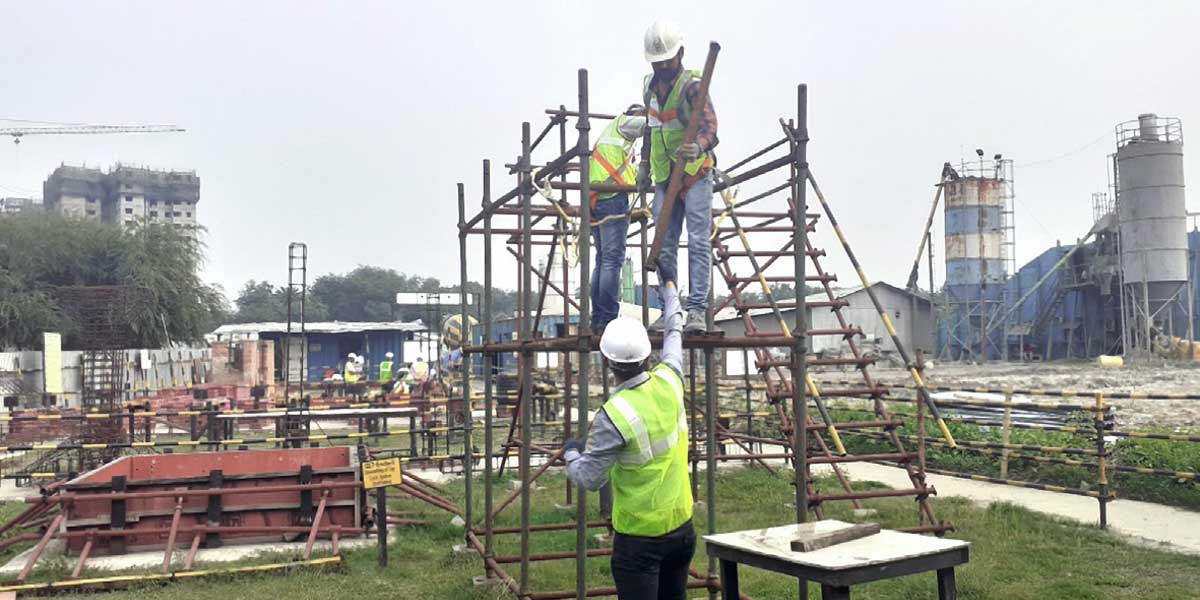- Home
- Real Estate
- Strategies for managing cash flow and the labour law regime in ongoing projects

Strategies for managing cash flow and the labour law regime in ongoing projects
Read full article
CW Gold Benefits
- Weekly Industry Updates
- Industry Feature Stories
- Premium Newsletter Access
- Building Material Prices (weekly) + trends/analysis
- Best Stories from our sister publications - Indian Cement Review, Equipment India, Infrastructure Today
- Sector focused Research Reports
- Sector Wise Updates (infrastructure, cement, equipment & construction) + trend analysis
- Exclusive text & video interviews
- Digital Delivery
- Financial Data for publically listed companies + Analysis
- Preconceptual Projects in the pipeline PAN India
NEERAJ DUBEY examines strategies to manage cash flow and the labour law regime in ongoing projects.Several construction projects have been affected adversely owing to COVID-19 and are still in various stages of development and implementation. It is critical that these projects are resumed. To reach pre-COVID efficiency and cash flow, it is imperative that certain measures are introduced by the incumbent Government and regulators to ease the burden of the real-estate sector in particular, which has witnessed many problems, especially labour shortage owing to reverse migration and a liquidity crunch.The Government has been announcing stimulus packages intermittently to keep the economy on track and create a better business environment. Business incentives and labour reforms go hand in hand as these two sides of the same coin need amicable motivation to coexist beneficially. Governments have been revisiting labour laws and revising them to create opportunities for business and employment.To create a conducive working environment for workers amid the pandemic, several states have brought about changes in their existing labour legislations to protect the interests of workers and get their economies going. Labour laws provide social security measures for workers; while these measures may help boost the economy, they have also raised concerns regarding protection of the rights of the Indian labour force. Labour falls under the Concurrent List of the Constitution; therefore, both Parliament and state legislatures can make laws regulating labour. In order to revive struggling industries, a lot of amendments have been made at both levels. Several state governments (Madhya Pradesh, Uttar Pradesh, Himachal Pradesh, Uttarakhand, Haryana and Gujarat) have eased labour norms: exempting the application of most laws for the next three-year period for either all companies, or new companies, or new companies set up in specific zones (as the case may be), except from the application of the Building and Other Construction Workers Act 1996, Workmen Compensation Act 1923, Bonded Labour System (Abolition) Act 1976, and the right to receive timely wages. To ensure uniformity in labour laws, central labour laws have been consolidated into four broader groups: industrial relations; wages; social security; and occupational safety, health and working conditions. This is an attempt to remove confusion by eliminating ambiguity and conflicting provisions, bringing in uniformity by removing multiple definitions and harmonising the provisions of various labour laws to benefit workers and employers similarly.RBI has reduced repo rates, which in turn has made home loans cheaper. This policy change indicates that people can now avail home loans at a lower rate of interest. These cheaper home loans would lead to increase in demand in the real-estate sector and, hence, increased cash flow. RBI has further provided a one-year project completion extension on asset classification for NBFC loans to the CRE segment; this measure allows breathing space for developers. Last, RBI has allotted Rs.100 billion to the National Housing Bank, which would help the real-estate sector reeling under the liquidity crisis. In a bid to increase flow of credit to the sector, RBI rationalised the risk weightage to loan-to-value ratio for all new housing loans sanctioned up to March 31, 2022. RBI has allowed for one-time loan restructuring without classifying them as NPAs to help companies and individuals manage the financial stress caused by the COVID-19 pandemic. These measures by the RBI will maintain liquidity in the system and ease the flow of credit. Further, the Ministry of Finance has classified the COVID-19 pandemic as a force majeure event under RERA. This move has unilaterally extended the project deadline by six months and will assist developers in maintaining cash flow until the supply chain is restored. While these measures will definitely assist developers in this dire situation, practically speaking they will have to actively engage with their financing partners to ensure availability of credit lines and explore new options. Within projects, the focus needs to be wide-based to payables, receivables and inventory–all fronts–while simultaneously putting extra efforts into inventory management. Cutting down variable costs and keeping capital investments to a minimum would be another key aspect. In case existing insurance coverage protects interruptions in business or projects, the facility should be availed. Discounts or some rebate on early payments can be offered to ensure timely payments. In terms of managing the business, it would be advisable to take full assistance of government-backed help while renegotiating the terms of purchases or pricing wherever possible to minimise costs. Managing compliance and regulatory hygiene to avoid wastage of money because of non-compliance should also be a key aspect of such governance. The Government has been taking steps to boost the economy but the impetus also lies with developers to keep their boats afloat by remaining diligent and following the necessary steps in the books to keep their projects or business running. Revisit strategies or projects, if need be, and breathe the fresh air of hope so that the crisis does not deter developers from conducting good and profitable businesses. About the Author: Neeraj Dubey, Partner, Singh & Associates, is a corporate lawyer with 16 years of legal experience encompassing the gamut of business law, IP, employment and technology law. He has significant experience of advising clients on corporate and commercial advisory, contracts, employment laws, and labour and industrial laws.
























